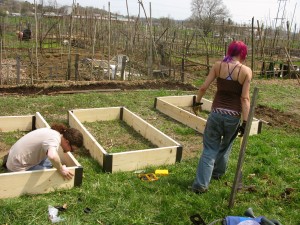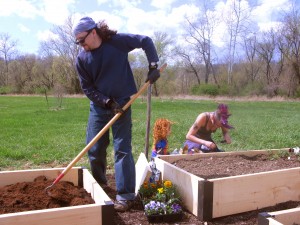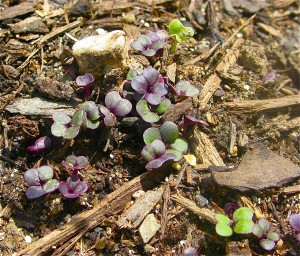Kitchen Gardens Grow Food and Families
Having grown up helping my grandparents tend their farm, I have a healthy respect for a good kitchen garden. I know exactly how much work goes into putting a garden together, how much time it takes to keep it going and how frustrating it can be when weather, bugs, and marauding raccoons do their level best to destroy every food-bearing plant in sight.
But I also know how good a garden can be for a family.
Not only does it provide nutritious, flavorful food to a family, it also gives a bounty of other benefits.
Let’s look at just a few of them.
First of all, it builds bonds between family members and generations. This is true of any shared creative endeavor, of course, but truly, a garden is a very large project and any time a group of people come together to make something that big, they grow closer in the process. Relying on each other and helping each other strengthen our respect for each family member’s abilities as well as affection for our foibles. We work, we strive, we build, we sweat, and we laugh. We have fun. It’s fun to make something appear out of what was once just a piece of ground with grass and weeds covering it.
Sometimes I think that living in the city as most of us do these days has made us forget how much fun all that work is–it’s satisfying in ways that putting together pre-fab furniture–something most urbanites do regularly–just isn’t. With the manual work of gardening, it’s all you. Garden plots don’t come with step-by-step instructions. It’s just you, your shovel and the ground, and when people work together like that, there is problem solving involved, and creativity. And that is good for minds of all ages.
It builds physical strength and endurance. This should go without saying, but I’m saying it anyway. The best shape I have ever been in my life has been when I have had a garden to tend. Until my Grandpa grew too ill to work in the last two years of his life, he kept a great big garden, and he worked in it every day. He was a wiry, skinny fellow his entire life and pretty darned fit. Morganna’s father’s grandfather died in his garden, near the asparagus patch. I remember when she called to tell me that and I comforted her by saying, “That garden was his pride and joy, and I think he died right where he was most at peace. There in the garden with his face to the sun and the blue sky and his back to the earth he tended most of his life.”
She said she knew I’d know what to say to make her feel better.
But both of those men were well past their eighties when they died and I cannot help but think it was those years of labor in the fields beneath the sun and in the fresh air that kept them so spry for so long. The same goes for my Gram who tended her beloved flower garden until the last year of her life. Caring for living things-plants, animals and people- and tending them–keeps us strong and healthy.
Gardening exercises our brains, too. It’s all problem solving, thinking on the fly, watching the signs in the weather, the birds, the earth itself, as we try and figure out when to plant. It gives us something to think about as we work–how many beans should we plant here? Will those tall tomatoes shade the lettuce enough in the summer so it won’t bolt? What are we going to do about those rabbits coming in and eating our baby peas? What are we going to do with all of those radishes?
Working in a garden gives children of all ages mental stimulation, too. It’s enough for the little ones to plant seeds and then watch in wonder as they grow from itty bitty inedible rock-like thing into a full-blown, tasty carrot. Kids get to see and experience so much in a garden. They get to see worms at work, ladybugs feasting on aphids, praying mantis hiding, camouflaged among green pea vines, and ants marching in endless parades. They get to smell the scents of newly turned earth, rain, and squash blossoms, they get to touch the prickles of an eggplant stem and the velvety softness of a haricot vert. They get to hear the song of the bluebird, the raucous call of the crow and the chopping sound of the hoe.
All of the sensory inputs make connections in a child’s brain, connections that will serve to teach the child so many things that will serve them well in later life. not to mention stimulating the growth of essential neural pathways. I personally am of the belief that humans can have no better classroom for a young child than a garden.
Gardens give us peace.
I can attest to this my own self. A few months ago, my blood pressure dove up precipitously. Stress was the probable reason, stress and a genetic propensity for high blood pressure. But, it was weird because it went up so quickly, and for decades my blood pressure had been on the low end of normal. I’m on medication for it, and the medication is working, but I also vowed to exercise, give up drinking coffee all day (now it is one cup in the morning and truly, I feel better for it), and try and meditate.
With the exception of the giving up the coffee part, working in the garden has provided what I needed to help control my blood pressure. Digging and clearing, hoeing and weeding, lifting and toting, all have helped give me lots of physical exercise, while planting and weeding, tending and just -being- out in the sunlight among the bluebirds and neighbors, has done wonders for my mental state. I feel more peaceful, less anxious and less angry the longer I work in the garden.
The same has been true with Morganna. The hard labor of clearing the ground gave her an outlet for her aggression and stress while the act of planting seeds and tending plants calms her down and makes her more able to slow her breath and just be.
Gardening puts urban folk back in touch with nature, with the world beyond iPods, laptops and reality television. Getting our hands dirty reminds us of where our food comes from, where all of life comes from. We are reminded that everything that humans have ever done, everything we have ever built, every concerto ever written, every novel, every skyscraper, every car and even the Mars Rover has come from one simple thing: the soil.
Without dirt, we are nothing. We depend on the fertility of the earth as much as we rely on the sun, and all of human culture is built upon the ground we walk on and ignore every day, the ground we encase in concrete and asphalt.
When we garden, when we grow some of our own food, when we get the dirt underneath our fingernails, our families are reminded of the glue that holds us together isn’t just bonds of love and respect.
It’s also plain old dirt.
Gandhi said it best: “To forget how to dig the earth and to tend the soil is to forget ourselves.”
1 Comment
RSS feed for comments on this post.
Sorry, the comment form is closed at this time.
Powered by WordPress. Graphics by Zak Kramer.
Design update by Daniel Trout.
Entries and comments feeds.






I recently started sharing a community garden plot with a friend. My husband suggested that making more than the current third of the front yard a garden might make selling the house difficult in a year or two. Of course, I live in a small city full of folks who like to garden, raise chickens, and have goats, so I’m not sure about that.
But it’s great. Kiddo has worked in the dirt, planted things, and helped me repurpose a never-used (and recalled) dropside crib into a garden gate. He runs and plays most of the time, watches ants and worms, and occasionally comes over to help yank weeds or ask for some chickweed to munch on. Good times.
Comment by Jocelyn — May 1, 2011 #